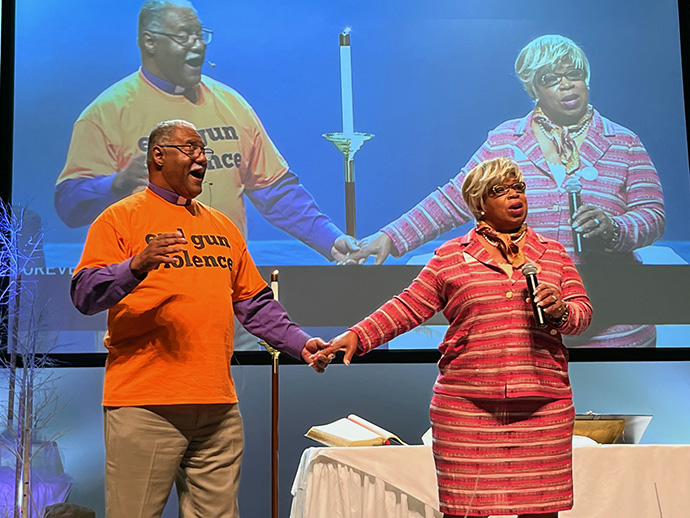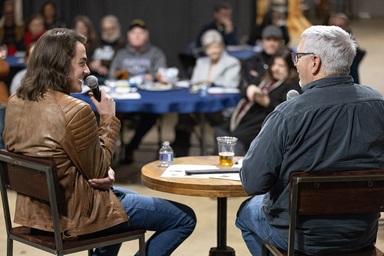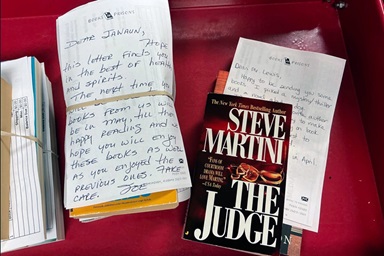Key Points:
- The recent U.S. annual conference season saw increasing support for removing United Methodist bans related to homosexuality.
- At the same time, a number of conferences reaffirmed the denomination’s fidelity to core Christian doctrines like belief in the Triune God and Christ’s resurrection.
- These votes come as the U.S. church is undergoing a difficult season of church disaffiliations while preparing for the international gathering of General Conference next year.
In their regional meetings this spring and summer, U.S. United Methodists signaled their desire for the denomination to become more LGBTQ-welcoming.
But even as they expressed openness to change some denominational policies, a number of annual conferences reaffirmed that United Methodists remain steadfast in their commitment to core Christian doctrines.
The year’s annual conferences met as The United Methodist Church in the U.S. is undergoing a season of church disaffiliations after decades of intensifying disputes over the status of LGBTQ people in church life. As of mid-August, more than 6,200 U.S. congregations — many with conservative views on sexuality and Scripture — had received the required approvals to withdraw from the denomination.
Annual conferences are the basic unit of the international United Methodist Church and consist of multiple churches and other ministries. The 53 conferences in the U.S. typically meet in spring and summer. Conference members join in worship, ordain clergy, celebrate ministry, memorialize members who have passed away, and conduct crucial business such as passing a conference budget.
But many conferences also will use the time together to consider resolutions that are aspirational but give a sense of how church members apply their faith to challenges both within the church and in the wider world. Half of the voters are lay and half clergy.

This year, several conferences began their sessions by approving requested church exits. But after completing that painful work, many of the U.S. annual conferences showed an eagerness to move toward a more inclusive future focused on the good that United Methodists can do together in the name of Christ.
“What we’re trying to emphasize in these resolutions is that we are still doctrinal, Jesus-loving, Trinitarian, Bible-believing people,” said Pat Luna, a member of Point Washington United Methodist Church in Santa Rosa Beach on the Florida panhandle and a leader in efforts to encourage people to remain United Methodist.
She was part of an Alabama-West Florida Conference group that submitted a resolution “Affirming the Doctrinal Standards of the United Methodist Church,” that the conference unanimously approved.
“In fact,” she added, “it’s because we believe in the Gospel of Jesus Christ that we also believe that LGBTQ people can be fully members of The United Methodist Church where it would make a difference, contextually, in fulfilling our mission of making disciples.”
The Book of Discipline, the denomination’s law book, bans the officiation of same-sex weddings and the ordination of “self-avowed practicing” gay clergy. Only General Conference, the denomination’s international lawmaking assembly that draws delegates from four continents, can alter those bans.
However, the conference votes do indicate growing energy in the U.S. portion of the denomination to reverse these policies as General Conference approaches. The legislative gathering, long-delayed by COVID, is now scheduled for April 23-May 3, 2024, in Charlotte, North Carolina.
More than resolutions
Beyond resolutions, the U.S. annual conference season showed other indications of how attitudes among the country’s United Methodists are changing.
Louisiana Conference voters overwhelmingly approved the formation of an “LGBTQIA+ Ministries Team” to help local United Methodist churches minister to the LGBTQIA+ community.
Altogether, 22 U.S. annual conferences passed resolutions supporting the removal of anti-LGBTQ language in the Discipline. That total does not include conferences that passed similar resolutions last year, but it does include conferences in the U.S. where the restrictions have received little pushback before.
The North Alabama Conference is one of them. The conference’s resolution both supports “the removal of all language pertaining to homosexuality” and affirms “a continuing commitment to honor the conscience and convictions” of all its churches and clergy.
“We will ‘make every effort to maintain the unity of the Spirit in the bond of peace,’” the resolution says, citing Ephesians 4:3.
The annual conference’s lay and clergy voters adopted the resolution by a vote of 236 to 151.
The Rev. Brian Erickson, one of the resolution’s co-submitters, acknowledged that he wasn’t sure the resolution would pass, let alone with nearly 61% of the vote. Many in the conference are traditionalist on matters of human sexuality.
But he said that after a substantial number of disaffiliations, those who remain in the North Alabama Conference want to find a way to move forward together.
“LGBTQ+ folks, as well as our progressive peers, want the language removed,” he said. “I think our traditionalist peers — the ones who have remained — just want to hear that there’s space for them, and that their scriptural convictions and their conscience are not going to be run over to remain a part of this family.”
Erickson, senior pastor of Trinity United Methodist Church in Birmingham, has seen that approach of honoring differing convictions work in his own theologically and politically diverse congregation. In the past year, Trinity United Methodist has welcomed 200 new members who transferred from nearby disaffiliating congregations.
The Rev. H.N. Gibson, associate pastor of East Lake United Methodist Church in Birmingham, co-submitted the resolution. As a queer person who uses they/them pronouns, Gibson said that they personally wanted to know if the conference they call home would support their continued ministry.
“What was most compelling to me about the resolution was not the resolution or its passing, but the respectful conversation surrounding it,” Gibson said. “In past years, I would have expected this resolution to be met with arguments about how those on either side or the other are not following Scripture, or, worse, for speakers to be met with audible groans of disagreement and even boos. Instead, we got to witness what respectful disagreement looks like.”
The annual conference resolutions follow last year’s approval by all five U.S. jurisdictions of similarly worded petitions that aspire to a future United Methodist Church “where LGBTQIA+ people will be protected, affirmed, and empowered in the life and ministry of the church.”
More actions at annual conferences
Annual conferences in the U.S. dealt with far more than the denomination’s homosexuality debate during their meetings this year.
A big source of conversation has been the Christmas Covenant, a proposal coming to General Conference that aims to put the U.S. and other geographic regions of the denomination on equal footing. So far, 26 annual conferences in the U.S. and nine in the Philippines have endorsed the Christmas Covenant. Efforts continue to refine the legislation before General Conference petitions are due Sept. 6.
Jurisdictions are U.S. regional bodies that encompass multiple annual conferences and handle bishop elections. The jurisdictional conference delegations voting last year include United Methodists who also will be General Conference delegates next year.
Jan Lawrence is the executive director of Reconciling Ministries Network, an unofficial United Methodist advocacy group that seeks LGBTQ equality, and championed these resolutions. She attributes the passage of so many resolutions to the fact that more people from more places are engaged in the conversation.
“That leads to people in annual conferences having a larger comfort zone,” she said. “It takes away some of the feeling of distrust that can exist in talking about issues of conflict when you’re working with a broad group of people and take care to make sure everyone has a voice.”
Still, even those working to amend the Discipline’s language on homosexuality recognize that no matter what happens at General Conference next year, the denomination will be home to members with differing views and differing legal and cultural contexts on matters of human sexuality.
Most annual conferences took action to emphasize the calling United Methodists all share. In the words of Methodism’s founder, John Wesley, that purpose is “to spread scriptural Holiness over these Lands.” They used their sessions to discuss church planting and commit to various evangelism efforts.
The Rev. Geoffrey Lentz is particularly excited that the Alabama-West Florida Conference unanimously and enthusiastically approved the “New Thing Challenge,” submitted by the conference’s Task Force on Church Planting and Revitalization that he chairs.
The resolution asks each church in the conference to do at least one new thing to reach new disciples. That could include starting a new worship service, initiating a Fresh Expression of ministry or helping one of the conference’s dozen new church starts. The resolution also asks each church to be more intentional in welcoming new members and receiving professions of faith.
When the resolution went up for a vote by a show of hands, Lentz said, “the whole auditorium was filled with people raising their hands in praise and celebration.”
Lentz, senior pastor of First United Methodist Church in Pensacola, said the church is already putting the resolution into action. His congregation is helping new churches in Orange Beach, Alabama, and Pace, Florida, and plans to launch a new congregation itself in a fast-growing community nearby.
Conferences also made clear that The United Methodist Church remains committed to the Apostles’ Creed and the doctrines found in the denomination’s Articles of Religion. Those core beliefs are not up for General Conference debate. These reaffirmations came as United Methodists have been contending with false accusations that the church is abandoning basic Christian tenets.
In addition to Alabama-West Florida Conference’s resolution reaffirming doctrine, the Kentucky Conference also unanimously passed a similar resolution submitted by its Board of Laity.
Subscribe to our
e-newsletter
“Just talking and being around our laity, especially, we were hearing a lot of concern about potential changes,” said Jonna Carter, the Kentucky Conference’s lay leader. “We wanted to just reaffirm that … we still believe in these basic foundational statements of faith. That’s not going to change. And if we all continue to be unified in that, then we will be able to continue working as a united front and a community of believers.”
John Denman, Carter’s fellow conference lay leader, said that a pastor walked up to him after the vote and said that the resolution contained exactly what his congregation was eager to learn.
Denman and Carter both spoke of the healing impact of emphasizing the beliefs and mission that unite the church.
United Methodists in the Texas Conference, which like Kentucky has seen about half its churches disaffiliate, also see the potential for healing in a resolution titled “Our New Life Together.”
The resolution confessed that the conference is recovering “from a season of conflict, division, power politics and competition.” As in Alabama-West Florida and Kentucky, the resolution also reiterated United Methodists’ shared faith in Jesus Christ. In addition, the resolution committed members to the Texas Conference to plant new churches and work “for a culture marked by compassion, courage and companionship.”
The resolution also passed nearly unanimously by a show of hands.
“After the vote was taken, the room felt heavy,” said the Rev. Brandi Horton, one of the resolution’s submitters. She is the executive pastor of St. Paul’s United Methodist Church in Houston.
“It was like we knew that we were not who we once were,” she said. “It was like a shedding of all the pain of the last few years. … It is a new day in the Texas Annual Conference. Thanks be to God.”
Hahn is assistant news editor for UM News. Contact her at (615) 742-5470 or [email protected]. To read more United Methodist news, subscribe to the free Daily or Friday Digests.




